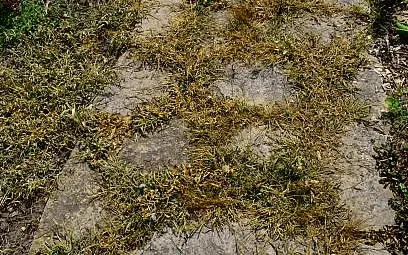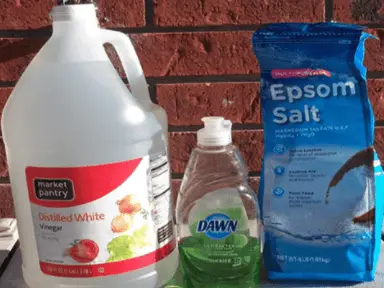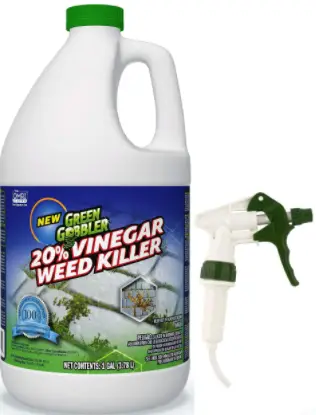Vinegar is known to be an effective, indiscriminate weed-killer that will get rid of any type of weed that it comes into contact with. What’s more, eco-friendliness that makes it a popular weed-killer over commercial chemical options- amongst homeowners. Using vinegar as a weed controller will not harm people, pets and environment.

When used by itself – however- vinegar only kills the above-ground parts of the weed leaving the root system behind.
This allows new weeds to sprout again over time. Which is where Epsom salt and Dawn dish soap come in.
A vinegar-Epsom salt-Dawn solution will ensure no plants ever grow in any parts of the soil that it comes into contact with. It permanently kill weeds and grass growing between patio stones, gravel drives and paths as well as cracks and crevices in walkways and sidewalks.
Acetic acid in vinegar is what makes it to kill weeds. Higher volume of acetic acid makes a potent weed killer but can be extremely dangerous. Any contact with the skin will result to severe burn. Make sure to use gloves, eye protection and face mask to avoid any contact when using commercial vinegar herbicides.
Concentrated acetic solution also kill every plant it come in contact with. Overuse will result into change in soil pH that will not permit any plant regrowth in that particular area. Spray drifts will also damage other desired vegetation.
Vinegar, Epsom salt + Dawn Dish Soap Weed Killer
To properly eliminate stubborn weeds that keep resurfacing even after prior elimination, prepare and apply a vinegar-Epsom salt solution as follows:

Things you will need
- Vinegar
- Epsom Salt
- Dish Soap
- Sprayer
Preparation
- Mix a gallon of five-percent household white vinegar with a cup of Epsom salt and stir until the salt is completely dissolved.
- Next, add a tablespoonful of Dawn dish soap to act as a surfactant. Surfactants help solutions adhere better to their targets upon contact. Again, stir the mixture for nice blend.
- Transfer the solution into an empty plastic spray bottle without metal parts.
How to use Vinegar on Weeds
Time when the weeds are two weeks after germination. This guarantees total weed control in a single application. If you wait longer, weeds will get established and you will have to repeat the spray. The best time to spray is when the day is dry, still and warm without winds or signs of rainfall or at least 48 hours after rainfall.
Wear safety gear including mask, eye protection and gloves, read and follow the instructions on the label if you are using a concentrated herbicidal vinegar. Protect your desired plants you wish to keep by placing cardboard boxes or plastic sheeting over them.
Spray all parts of the weed, including the stems and the undersides of leaves. Avoid spray drifting on any metal or masonry surfaces, including fences, garden furniture, walls, patios, driveways or sidewalks to protect them from corrosion and staining.
After you have finished, remove the protection you placed over your desired plants. Rinse the spraying equipment thoroughly with clean water and wash your hands with soap and water.
How long does Vinegar take to Kill Weeds
Vinegar contain acetic acid that affects the cell membranes of a plant cell, causing rapid breakdown of any foliage tissue.

Herbicidal vinegar is stronger than household vinegar, the acetic acid concentration for herbicidal use is 10 -20%, compared to 5% acetic acid in household vinegar.
The time it takes for the weeds to disappear depends on the concentration of vinegar used. For instance- solutions with lower concentration may take two to three days to completely kill the weeds. Herbicidal vinegar with 10-20% acetic acid will kill weeds within 1-2 hours.
Regular 5% kitchen vinegar effectively controls broadleaf weeds as compared to most grasses or grassy weeds. In the first application, the grasses will die back but eventually recovers. To completely control grassy weeds or kill grass with vinegar, spay every time they regrow until they completely die and disappear.
How to increase Vinegar Efficacy
- Do a thorough spray coverage
- Add a surfactant to improve control
- Spray when weeds are small or newly germinated
- Repeat applications for larger and established weeds
- Lower concentrations at high spray volumes
- Do not apply more frequently than every two weeks
- Application must be delayed 24-48 hours or more after rain
- Avoid contact with metals or using in a metallic spray equipment
Vinegar vs commercial weed killers
Using vinegar to manage weeds has some benefits over commercial herbicides:
- Vinegar is ecofriendly and safe around pets and humans
- It is less expensive and readily available in our kitchen
- Excellent for controlling small annual broadleaf weeds
- It us a natural rapid weed management that kills plants within 24 hours
- Most effective for controlling weeds in gravel, on patios and cracks in driveways/sidewalks
Disadvantages of using vinegar
While using acetic acid to control weeds sound good, here are the downside you should also know:
- In higher acidity, vinegar is really dangerous
- Low concentration may not kill well established large weeds
- May require multiple applications to kill grassy weeds permanently
- Can alter soil pH making it difficult for any plant to grow in the area
- Vinegar is nonselective, it will harm or kill other good plants if applied
- Vinegar has a sharp odor that may not be pleasant to many people
- Severe skin burns and eye irritation when a exposed to higher concentrations
How long does vinegar last in soil
Vinegar is acidic and will automatically lower the soil pH. This will make it unsuitable for any other vegetation to survive in the contaminated area. The effects of a highly concentrated vinegar in the soil can last longer than a month.
Carefully spraying vinegar onto plant leaves and stem will only cause few drops of the ingredient to fall onto the soil. In such little amounts, vinegar should disintegrate within a few days usually less than a month.
Always remember that, vinegar is a non-selective weed controller than can also damage other desired plants including lawns. Higher concentrations of acetic acid is corrosive and thus should always be used with caution.
References:
Vinegar and Epsom Salt as Herbicides – University of Minnesota Extension
Is vinegar a safer Herbicide – Stan Smith, OSU Extension PA, Fairfield County
Using Vinegar as a Herbicide – University of Illinois Extension
Spray Weeds With Vinegar – USDA Agricultural Research Service
If you haven’t ever used an organic weed killer before, you might want to give them a try. If you’re trying to eradicate a large amount of weeds in your yard or if you’ve never used an organic weed killer in the past, these should be your first choice.